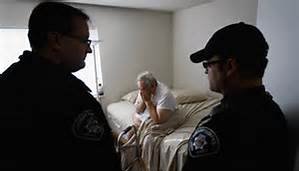Sadly, it’s a term you may come to hear more often: ‘nursing home evictions.’ While it is true that nursing homes and chronic care facilities have the right to evict a resident for just cause—and those causes are generally limited to six—a trend has been growing where residents have been evicted more for reasons of convenience.
Or worse—because the facility thinks it can earn more revenue for the bed from a more well-heeled source.
“When they get tired of caring for the resident, they kick the resident out,” said Richard Mollot of the Long Term Care Community Coalition, a New York advocacy group. Complaints and lawsuits across the U.S. point to a spike in evictions even as observers note available records only give a glimpse of the problem.
An Associated Press analysis of federal data from the Long-Term Care Ombudsman Program finds complaints about discharges and evictions are up about 57 percent since 2000. It was the top-reported grievance in 2014, with 11,331 such issues logged by ombudsmen, who work to resolve problems faced by residents of nursing homes, assisted living facilities and other adult-care settings.
The American Health Care Association, which represents nursing homes, defends the discharge process as lawful and necessary to remove residents who can’t be kept safe or who endanger the safety of others, and says processes are in place to ensure evictions aren’t done improperly. Dr. David Gifford, a senior vice president with the group, said a national policy discussion is necessary because there are a growing number of individuals with complex, difficult-to-manage cases who outpace the current model of what a nursing home offers.
“There are times these individuals can’t be managed or they require so much staff attention to manage them that the other residents are endangered,” he said.
The numbers of both nursing homes and residents in the U.S. have decreased in recent years; about 1.4 million people occupy about 15,600 homes now. The overall number of complaints across a spectrum of issues has fallen in the past decade, though complaints about evictions are down only slightly from their high-water mark in 2007, the federal figures show. Meanwhile, the share of complaints that evictions and discharges represent has steadily grown, holding the top spot since 2010.
Offending facilities routinely flout federal law, attempting to exploit and widen justifications for discharge. They say hospitalizations are a common time when facilities seek to purge residents, even though the Nursing Home Reform Act of 1987 guarantees Medicaid recipients’ beds must be held in their nursing homes during hospital stays of up to a week.
“They try and take the easy way out and refuse to let the person back in,” said Eric Carlson, an attorney who has contested evictions for the advocacy group Justice in Aging.
Federal law allows unrequested transfers of residents for a handful of reasons: the facility’s closure; failure to pay; risk posed to the health and safety of others; improvement in the resident’s condition to the point of no longer needing the home’s services; or because the facility can no longer meet the person’s needs.
Though that final category is often cited in evictions, advocates dispute how often it fits.
“The majority of the time, it’s because the resident is considered difficult,” said Tony Chicotel, an attorney for California Advocates for Nursing Home Reform. Chicotel says involuntary discharges are almost entirely focused on Medicaid beneficiaries and that economics sometimes play a role in the ousters. Rather than a long-term Medicaid patient, many facilities would prefer to fill a bed with a private-pay resident or a short-term rehabilitation patient, whose care typically brings a far higher reimbursement rate under Medicare.



